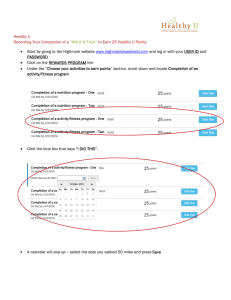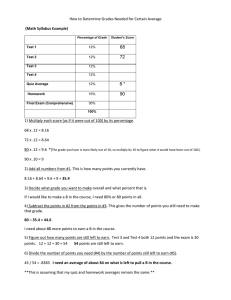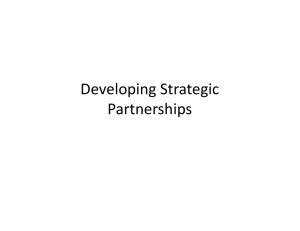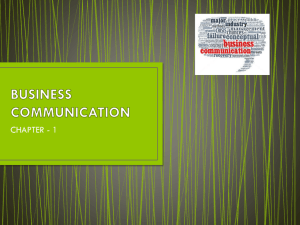A Talent Development Solution: Exploring Business Drivers
advertisement
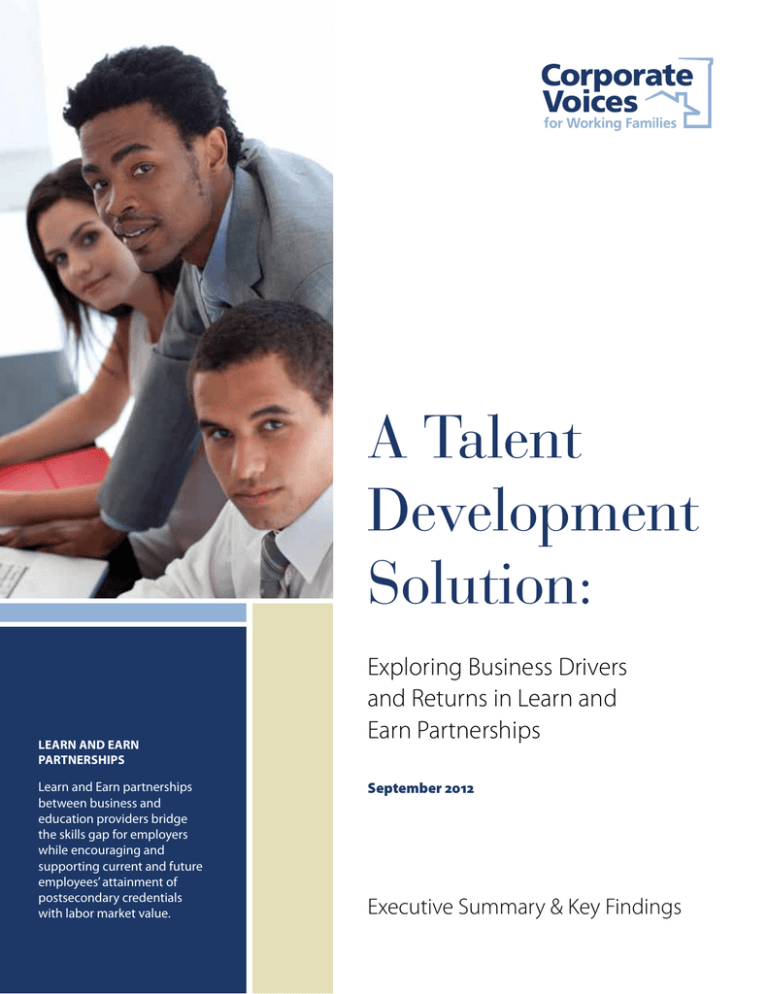
A Talent Development Solution: LEARN AND EARN PARTNERSHIPS Learn and Earn partnerships between business and education providers bridge the skills gap for employers while encouraging and supporting current and future employees’ attainment of postsecondary credentials with labor market value. Exploring Business Drivers and Returns in Learn and Earn Partnerships September 2012 Executive Summary & Key Findings Executive Summary For more than a decade, Corporate Voices for Working Families (Corporate Voices) has cultivated public and private policies that promote the wellbeing of working families while strengthening our nation’s economy and enhancing the vitality of our communities. Our partner companies lead their industries in developing best practices that both help working families and meet bottom-line business goals. Nowhere is this more evident than in Corporate Voices’ work on jobs, skills, education and training. A Talent Development Solution provides a summary of research Corporate Voices conducted over the past 24 months identifying the practices, characteristics, and returns of innovative, business-led partnerships between employers and education providers. It presents a comprehensive overview of this emerging Learn and Earn field—an approach to the connections between employers and education providers that builds the talent pools employers need and offers employees the opportunity to gain tangible skills and earn a postsecondary degree or credential, and a path to a brighter economic future. Corporate Voices came to this work through early research in Are They Really Ready to Work 1, which highlighted the gap between the 21st-century skills employers need and what they are getting from applicants and new hires. Further research in The Ill-Prepared Workforce 2 showed that while employers are committed to overcoming skills deficits in their workforce through an array of programs, most do not have a clear understanding of the impact of these programs. A Talent Development Solution explores the business impact of Learn and Earn partnerships, offering examples from some of the nation’s leading corporations. Profiled in case studies throughout the report are 22 best-practice companies that range in size, sector, location, and type of education partner. The report documents significant positive returns companies can realize by investing in Learn and Earn initiatives—impacts that go beyond building a talent pool, which is a key driver of Learn and Earn models, to employee engagement, diversity, corporate brand recognition and more. A Talent Development Solution aggregates many lessons learned from Learn and Earn partnerships. A primary lesson is that Learn and Earn partnerships work. These partnerships serve business interests, enabling employers to build a better-skilled workforce by leveraging the strengths education providers bring to the table. At the same time, these partnerships create valuable opportunities for employees—especially for lowerincome individuals, who often have no choice but to earn a living while they pursue higher education. Finally, A Talent Development Solution provides willing business leaders a roadmap to establishing partnerships that leverage current workplace practices and policies, such as tuition assistance and flexibility benefits that enhance workplace performance while supporting the education and career aspirations of working learners. At this time in our nation’s history, when Americans look to business for leadership in a challenging employment market, Corporate Voices invites employers to consider the Learn and Earn practices presented in A Talent Development Solution. Learn and Earn Model Partnership 1 Corporate Voices for Working Families, The Conference Board, Society for Human Resource Management and Partnership for 21st Century Skills. Are They Really Ready to Work? Employers Perspectives on the Basic Knowledge and Applied Skills of New Entrants to the 21st Century U.S. Workforce. Washington, D.C.: Corporate Voices, 2006. 2 Corporate Voices for Working Families, ASTD, Society for Human Resource Management and The Conference Board. The Ill-Prepared U.S. Workforce Exploring the Challenges of Employer-Provided Workforce Readiness Training. Washington, D.C.: Corporate Voices, 2009. Key Findings A Talent Development Solution explores successful Learn and Earn partnerships to answer these and other questions: Why does Learn and Earn work for business? • Business imperatives drive these partnerships and they are usually designed to meet bottom-line business needs • Companies realize a range of returns on their investment, including higher employee retention, increased productivity, and enhanced reputation • Successful partnerships serve employees’ needs by offering flexibility and helping them balance the demands of work and school What makes a model Learn and Earn partnership? • A clear business imperative, such as the need to stabilize a company’s workforce • A strong relationship between business and an education provider • Relevant curriculum linked to a postsecondary credential and career advancement • The ability to measure and track progress of the investment Who benefits from Learn and Earn partnerships? • Employers—through improved talent development and bottom-line contributions • Employees—both current and prospective • Education providers—by gaining strong business partners • A range of companies across industry sectors and geographic areas • Local economies—by virtue of a better-skilled workforce in their region What are the challenges and opportunities to creating Learn and Earn partnerships? • Large employers in multiple locations can find it challenging to implement local solutions, but successful models do exist • Cultivating willing partners can be difficult, but partnerships provide a valuable source of talent • Measuring success can also be challenging, but business decisions are data driven What works in Learn and Earn partnerships? • A corporate culture, starting at the top, that supports talent development and learning • Other business practices that promote lifelong learning, including tuition assistance utilized as a talent strategy to encourage employees to pursue higher education • Leveraging the expertise of strong education providers Employer Practices that Support Learn and Earn Models Best Practice Description Best-Practice Company Tuition Assistance Programs Accredited Corporate Training Flexible Work Scheduling Prior Learning Assessment Public and Private Partnership Best practices include: pre-paid tuition, books, stipend, recognition of academic milestones and completion bonus. Work with colleges, universities and the American Council on Education to gain accreditation or credit recommendation for internal training. Applying flexibility policies to working learners to support academic schedules. Support for process of attaining academic credit for prior learning, training or experience gained outside of a classroom. Participation in regional collaborations with public entities to establish education supports and pathways. May include working with the public workforce system or regional economic development authorities, usually in partnership with education providers. Collaborate with higher education providers to provide contextualized learning opportunities. This is often a formalized process with academic credit and often salary. Contextualized learning with work experience and support for participants with career and education guidance. Links academic achievement to defined career pathways and talent management strategies. Full-time paid employment with benefits while learning a trade and earning a credential. Acknowledgement of the value of industry- recognized credentials and certifications with specific monetary support for attainment. Best practices also reward attainment. Establish blended learning opportunities with online, on-demand access or on-site instruction. Most Best-Practice Companies Cooperative Education Partnerships Internship / Mentorship Career Navigation Apprenticeships Supporting IndustryEndorsed Skills Certifications Negotiate Instructional Delivery Walmart; Bright Horizons Family Solutions; McDonald’s Millstone Power Station; AREVA; Health Careers Collaborative (HCC) Walmart; McDonald’s; Verizon Wireless AREVA; CVS Caremark; Georgia Power; HCC; IBM; Pacific Gas and Electric (PG&E); Toyota & AMTEC; UPS & Metropolitan College Applied Scientific Instrumentation; Crest Cadillac AOL & Year Up; Expeditors; KPMG LLP CVS Caremark; PG&E; Verizon Wireless Northrop Grumman Shipbuilding Bison Gear and Engineering Corporation; Georgia Power; Western Association of Food Chains (WAFC) Convergys; Verizon Wireless; WAFC Looking Forward The American business community currently spends $485 billion every year on training and development and it will continue to spend billions in developing the skilled talent it needs to compete in the 21st century. The sheer size of this investment exceeds public investment in higher education, reflecting employers’ vested interest in a first-rate workforce. This investment automatically makes the business community participants in any discussion about education and training. For leading businesses, Learn and Earn programs represent an opportunity to take proactive roles in finding solutions to their talent needs and our national workforce challenges. As ongoing research suggests, Learn and Earn partnerships offer 1020 19th Street, NW, Suite 750 Washington, DC 20036 202-467-8138 www.corporatevoices.org meaningful returns for companies profiled in this series. These businesses have discovered the real potential of Learn and Earn partnerships to meet immediate talent development needs, to support educational attainment among employees and to enhance the skills and economic competitiveness of the regional labor markets from which companies draw talent. Corporate Voices is committed to expanding knowledge of the value of Learn and Earn partnerships and to challenging employers to adopt policies and practices that support this effective talent development solution. A Talent Development Solution provides a real path forward for employers eager to establish meaningful partnerships that support their talent development goals. About Corporate Voices for Working Families Corporate Voices for Working Families is the leading national business membership organization shaping conversations and collaborations on public and corporate policy issues involving working families. A nonprofit, nonpartisan organization, we create and advance innovative policy solutions that reflect a commonality of interests among the private sector both global and domestic, government and other stakeholders. We are a unique voice, and we provide leading and best-practice employers a forum to improve the lives of working families, while strengthening our nation’s economy and enhancing the vitality of our communities. Corporate Voices would like to thank The Bill & Melinda Gates Foundation for its generous support of our Learn and Earn initiative and this research project. Copyright © 2012 by Corporate Voices for Working Families
